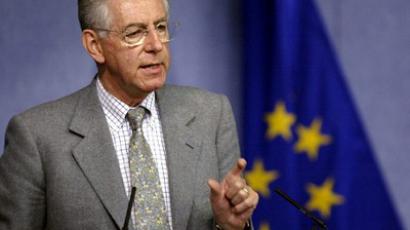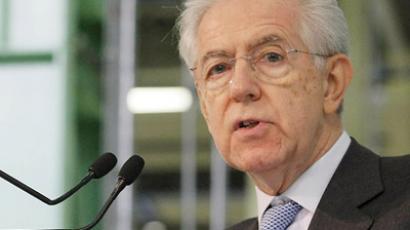EU holds breath over crucial Italy election
The polls have closed on the first day of voting for Italians. In the two days they will have to elect a new government to pull the country out of its deepest recession in 20 years. Markets are jittery, with the results seen as crucial for the eurozone.
The financial world wants the Italian election to deliver a strong government capable of firm action, which would prevent the looming Greek-style scenario in the eurozone’s third-largest economy.
The London-based economic research company Capital Economics warns that “a hung parliament might plunge Italy and the eurozone back into crisis rather sooner.”
The outcome, that would have satisfied the economists would be a center-left government headed by Pier Luigi Bersani and backed by incumbent PM Mario Monti, who leads a centrist coalition.
Bersani promises to stay committed to budget discipline, introduced by outgoing Monti and hailed by the economic community, but pledges not to go too far with austerity.
The most recent opinion poll of two weeks ago showed Bersani leading, making him the most likely winner. What raises doubts is Monti coalition’s ability to strengthen Bersani’s position. The bitter pill of social cuts he prescribed to the ailing Italian economy put the public off, leaving his party with no more than 13 per cent in the polling.
Silvio Berlusconi is also breathing down Bersani’s neck, only five points behind according to the pre-election poll. Despite the four-time prime minister being mired in scandal, his promise to pay back an unpopular property tax has struck a chord with austerity-wearied Italians.
The third-largest electoral force in the country makes polling results still more unpredictable. It’s the anti-establishment Five Star Movement, led by hugely charismatic comedian-turned-politician Beppe Grillo. At his final rally he addressed Italy’s mainstream politicians with: "You have consumed the entire country, the lives of thousands of people. You must go home," as cited by the BBC.
While Grillo’s popularity with Italians has skyrocketed, economists fear his party’s presence in the parliament could bring about destabilizing consequences.
Among Grillo’s market-worrying pre-election promises is one to hold a referendum on abandoning the euro.
Italy’s electoral system itself is yet another surprise factor. There’s the lower house of the parliament, controlled by the party, which wins majority in the national popular vote. But there’s also the upper house, where seats are distributed on a region-by-region basis. That may potentially lead to opposing forces gaining control of the two chambers, leading to gridlocked decision-making, something not new for Italy.
“… Monti had to deal with an elected Parliament made up of lots of political parties with contrasting views on what to do and even on the needs of the reforms,” says Dr. Marco Airaudo, a Drexel University economist.
When questioned about the price of making the wrong decision
when choosing a candidate, political and strategic analyst
Alessandro Politi had this to say to RT: "It means more
austerity, which really isn't needed. It means more plundering of
Italian precious industrial, assets, more hardship at social level
and - yes, it could mean also a sort of Arab revolution, if not
just the political class, but also the entrepreneurs don't open
their eyes and act in a responsible way."
Now it’s all in the hands of 47 million Italians, who have been urged by the Interior Ministry to make it to the ballot boxes despite bad weather. People will be able to cast their votes on Sunday until 21:00 GMT. Polling booths will then be reopened on Monday from 6:00 till 14:00 GMT. Early results are expected on Tuesday.














